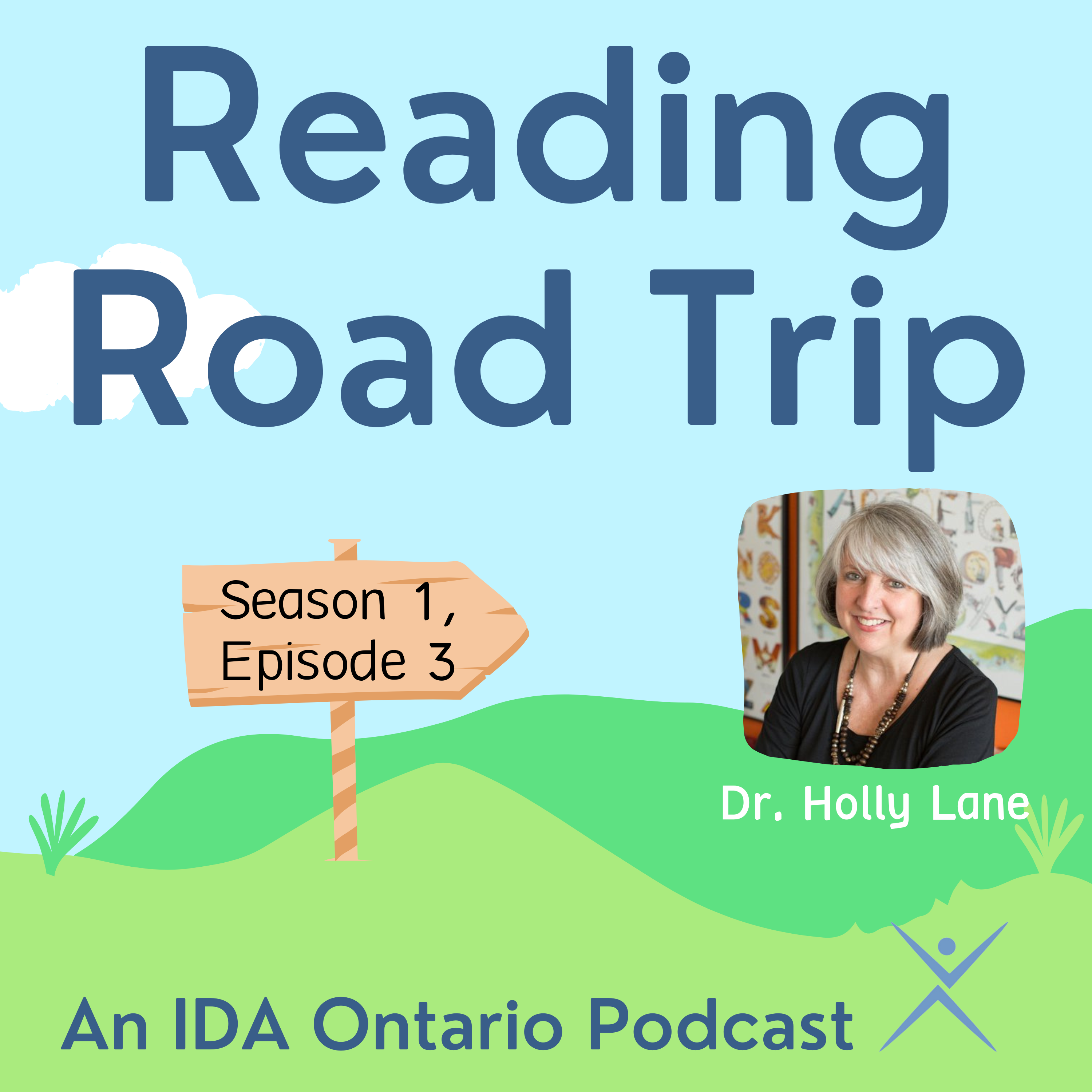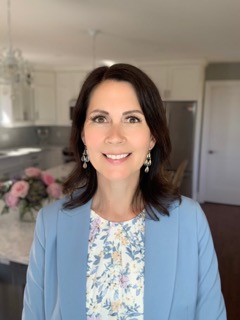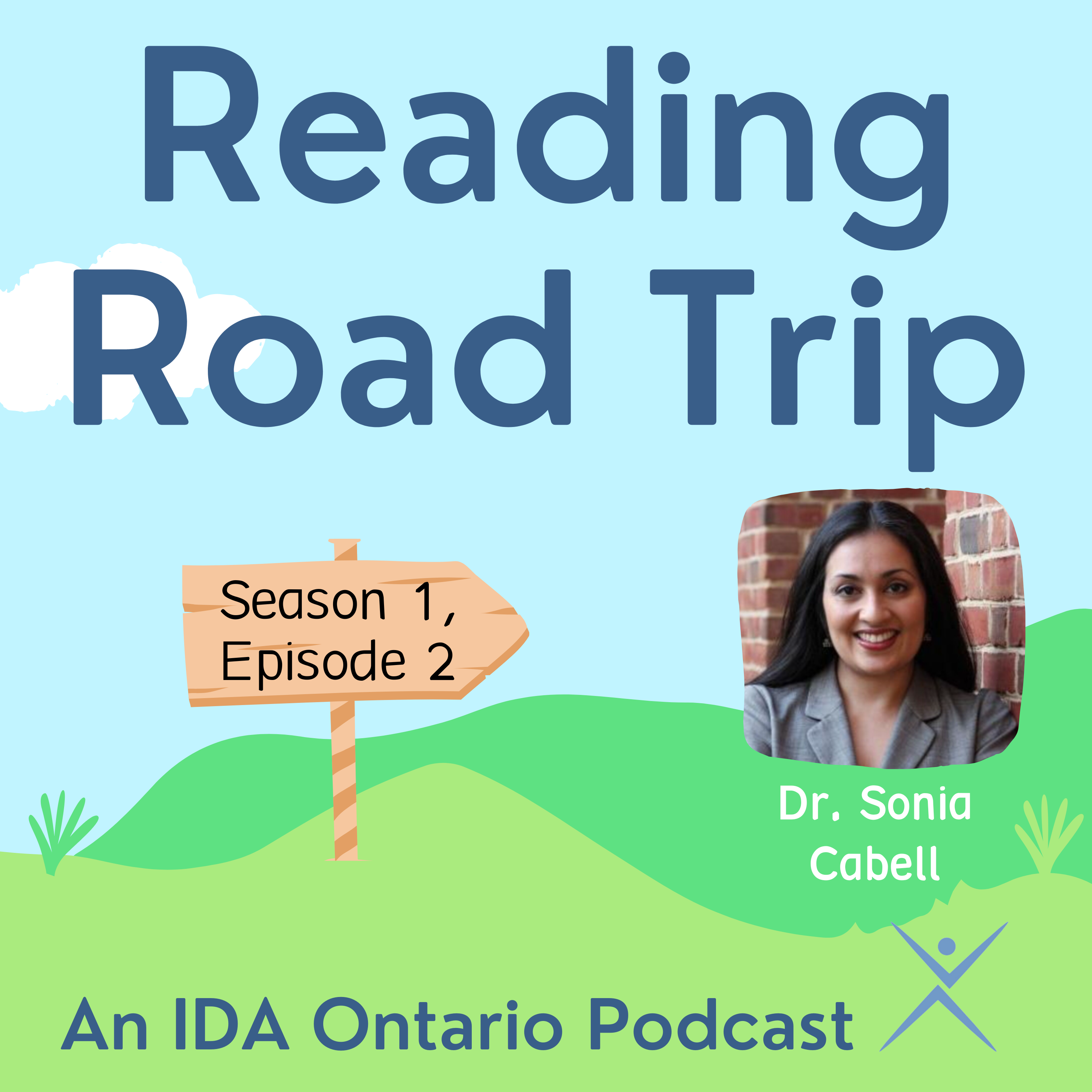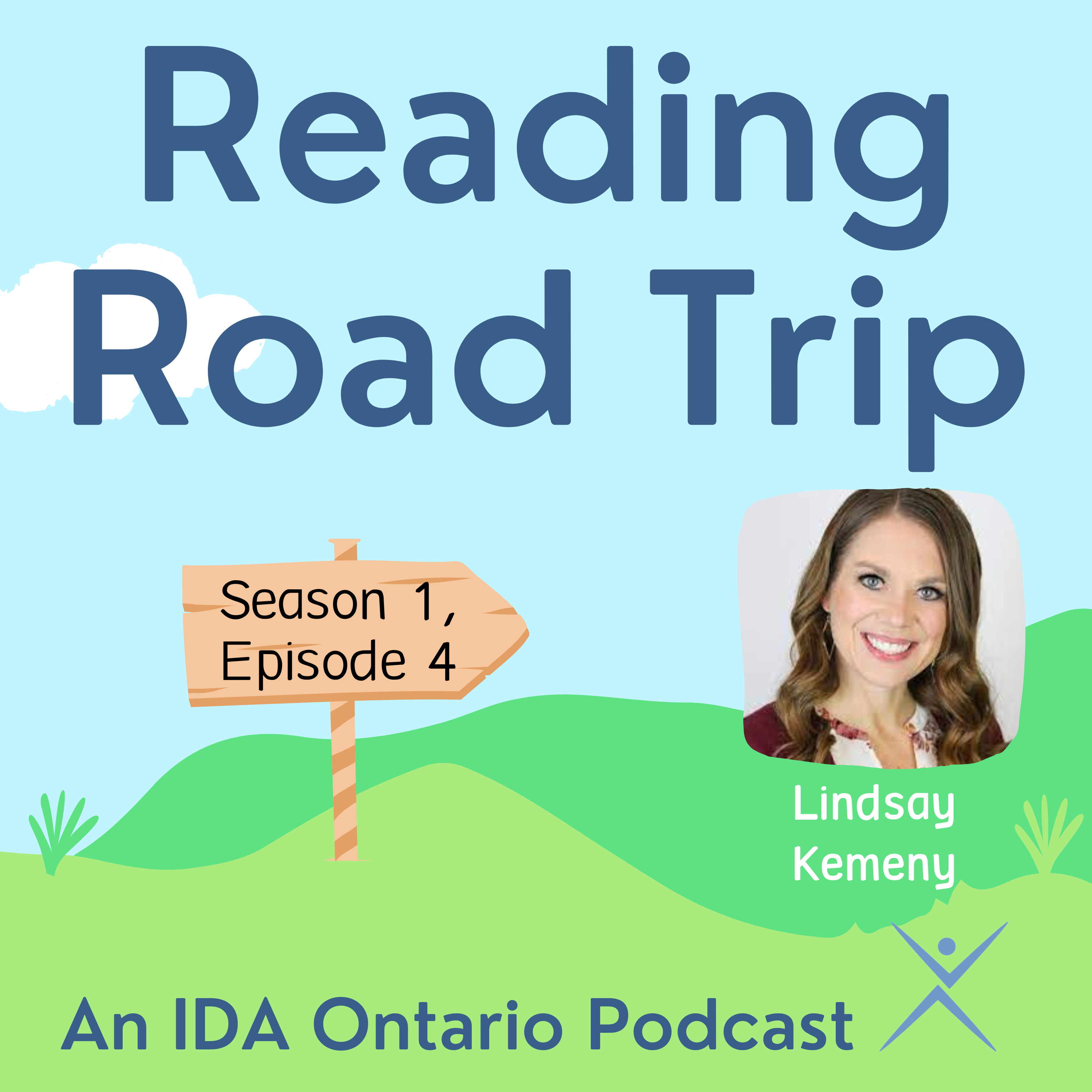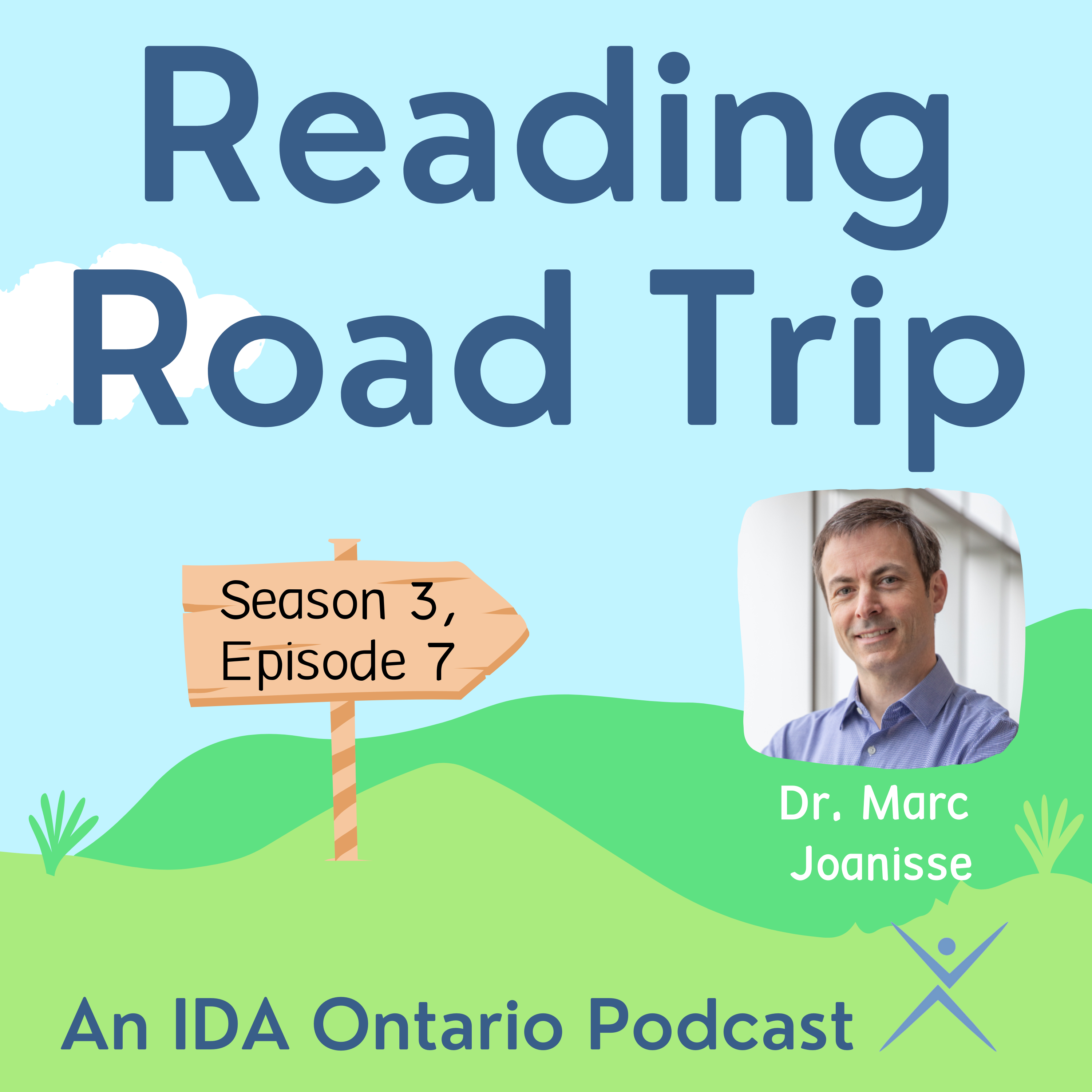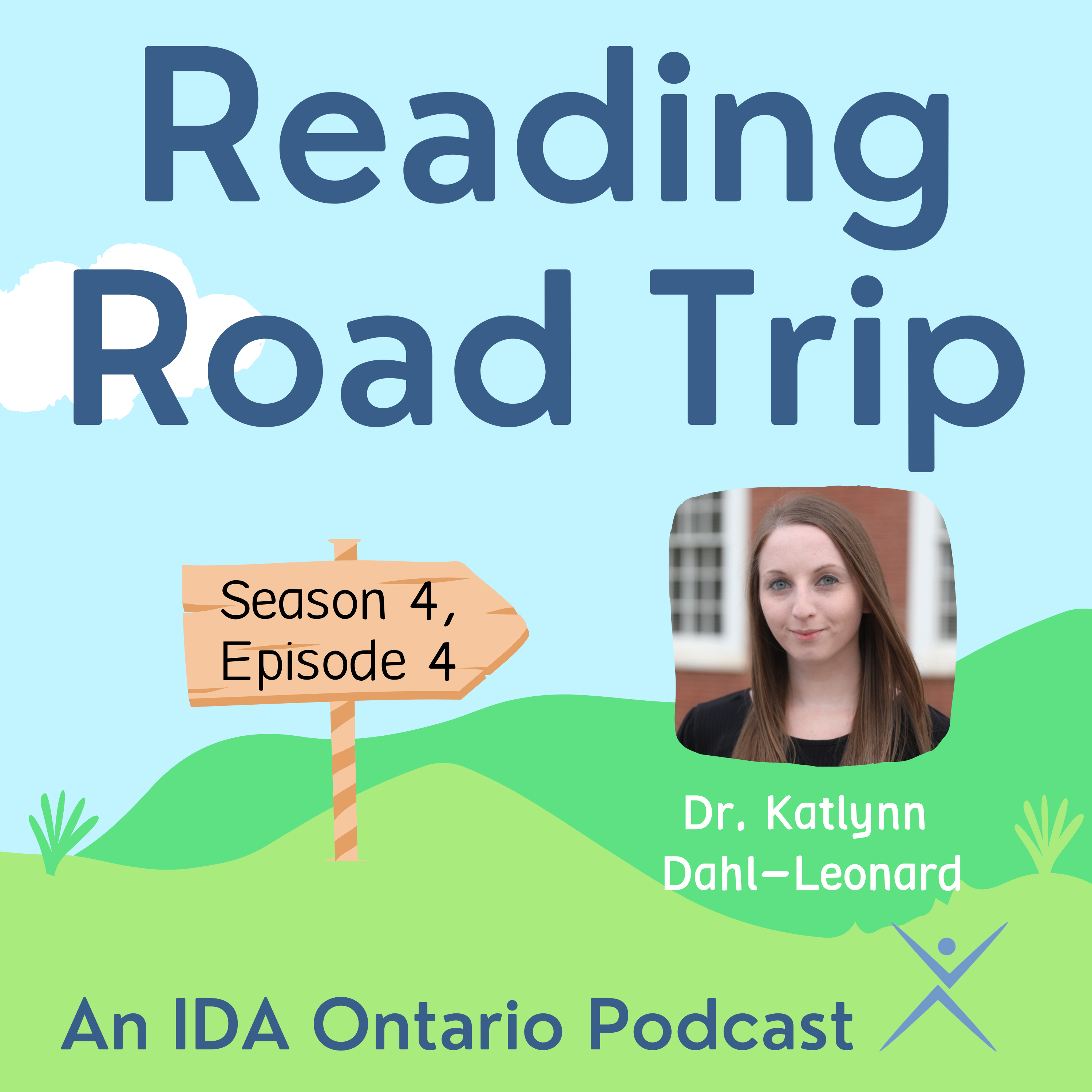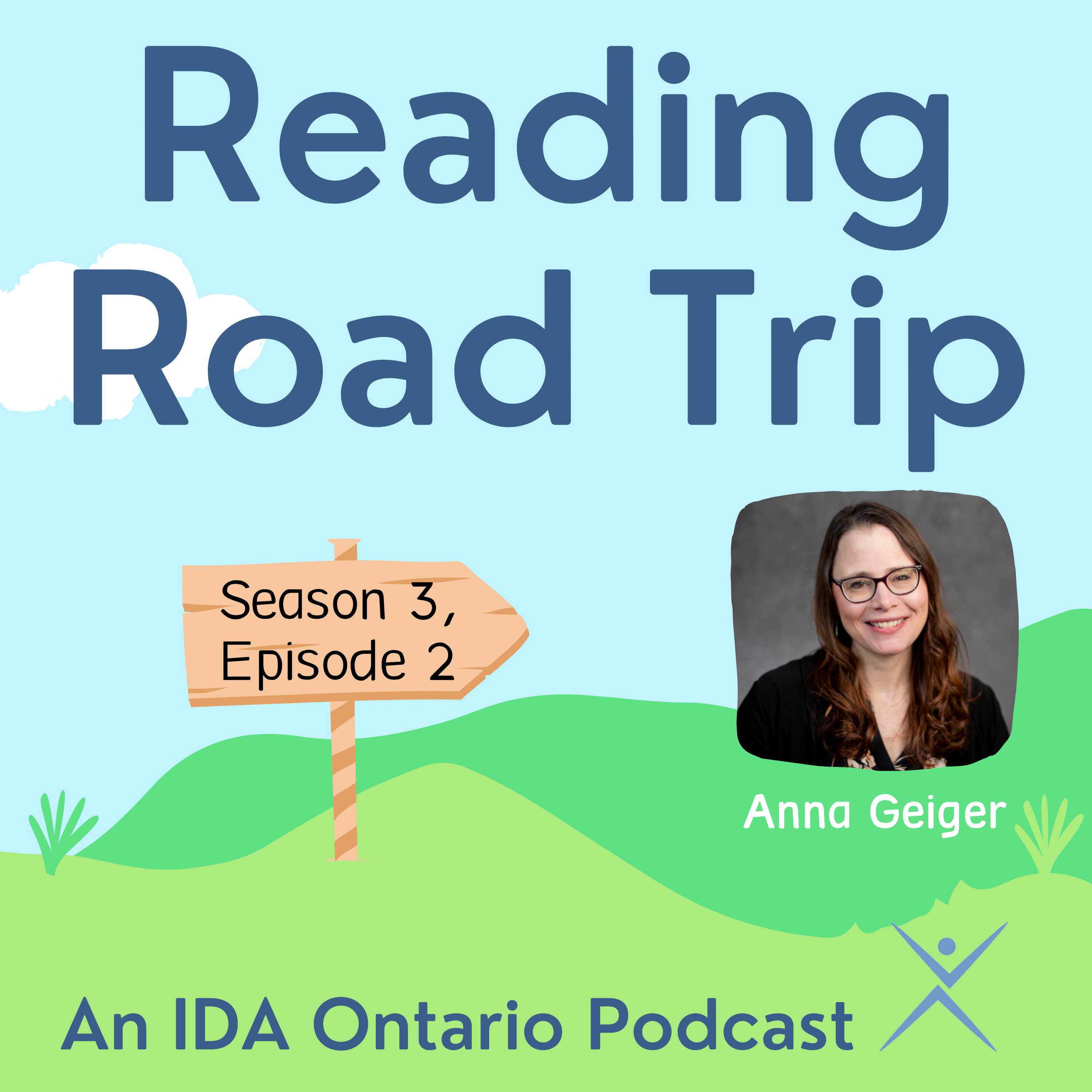Episode Transcript
Kate Winn 00:00:05 Hello to all you travelers out there on the road to evidence-based literacy instruction. I'm Kate Winn, classroom teacher and host of IDA Ontario's new podcast, reading Road Trip. Welcome to the show. This is episode three of our very first season.
Before we get started, we would like to acknowledge that we are recording this podcast from the traditional land of the Mississauga Anishnabe. We are grateful to live here and thank the generations of First Nations people for their care, for and teachings about the Earth. We also recognize the contributions of Metis, Inuit, and other Indigenous Peoples in shaping our community and country. Along with this acknowledgement and in the spirit of truth and reconciliation, we'd like to amplify the work of an indigenous artist. And this week we are sharing Oolichan Moon by Samantha Beynon, illustrated by Lucy Trimble, the beautifully illustrated children's book about passing down traditional knowledge from Nisga’a elders and the sacredness of traditional foods, particularly the oolichan fish. Add this one to your home or classroom library today and now on with the show.
I'm so excited to welcome our guest this week. She is a literacy researcher, a teacher educator at University of Florida, and co-author of the UFLI Foundations, which is the Foundational literacy program for K to two from the University of Florida Literacy Institute. Welcome to the conversation, Dr. Holly Lane.
Dr. Holly Lane 00:01:29 Thank you for having me.
Kate Winn 00:01:31 So we are going to jump into foundational skills here, and I do want to remind our listeners that yes, of course we both know there is a lot more to literacy than just these foundational skills, more to a structured literacy approach. But because this is a big area of expertise for you, I want to tap into all of your knowledge to talk about phonemic awareness and phonics. So while we're going to cover a whole range in this season, that's kind of what we're, we're starting with today. So the first thing I'd like to ask you is could you just give us your working definitions of phonological awareness, phonemic awareness, and phonics, to make sure we're all kind of on the same page for this conversation?
Dr. Holly Lane 00:02:06 Sure. So I would start with, um, phonological awareness being, um, the umbrella term where, uh, really addresses, uh, the conscious awareness of or sensitivity to the sound structure of language in different size units. So words, syllables, intrasyllabic units, and phonemes. Phonemic awareness we can think of as the conscious awareness of that smallest unit of sound and spoken language. Phonics is the understanding of the alphabetic principle and the, the ability to apply that principle in encoding and decoding words. So these are all very closely related constructs, but they're not the same. And it, it's important to distinguish them, but I think we've kind of maybe gone overboard with distinguishing them, um, with one particular, um, element of it. And that is the idea that once you include print the alphabet, uh, it does become phonics instruction. But I think a lot of teachers are under the impression that it is then no longer phonemic awareness instruction. And that misconception is problematic because I think a lot of teachers think that there is some sort of requirement that kids spend a lot of time in oral only phonemic awareness instruction without letters, where actually, if they're including letters, it is both phonemic awareness instruction and phonics instruction if kids are actively blending and segmenting sounds.
Kate Winn 00:03:51 Thank you very much. So I am going to now make myself vulnerable here. I'm gonna pretend I'm one of your students and I'm going to sort of summarize what I think, uh, classroom teachers are kind of taking away from the research now. And then please tell me, you know, where I, where I missed the mark or what I might be be missing.
So we do know that some oral only phonemic awareness, you know, back from the National Reading Panel, that that does improve phonemic awareness. And we know phonemic awareness is, you know, uh, connected to reading. So that's not bad. So a little bit of that oral piece, cuz I'm thinking about the practicality of classrooms, right? You're doing a transition, you're in the hall, you're doing a little bit, that's okay. We know not to spend too much time on that. We know to focus on blending and segmenting as sort of the key areas. Um, and we also don't have to master the larger units. They don't have to master syllables, master anything like that first school age we're, we're into the phonemes. We also know that incorporating letters right away is a good idea. So even if we might have tiny little pockets of the oral piece, we wanna make sure that we're doing that phonics and then the PA and the phonics help each other out for the big picture. Does that sound right?
Dr. Holly Lane 00:04:56 That's all very good. You're a very good student, <laugh>.
Kate Winn 00:05:00 Thank you. Ok. Just wanna make sure we're, we're on track here. Now, specifically speaking of phonics, I'm in Ontario, the Ontario Human Rights Commission conducted their Right to Read Inquiry. 157 recommendations for, you know, the Ministry of Education, for higher learning, for school boards. One of the recommendations was explicit and systematic phonics, beginning instruction, beginning in kindergarten. So I know there are a lot of teachers saying, oh, we don't need to hear this. Like, I've always taught phonics, but I'm not sure everybody has a clear idea of the explicit and systematic pieces. So I was hoping you could maybe shed some light on what those two terms mean.
Dr. Holly Lane 00:05:36 Sure. So, um, when I say explicit, what I'm referring to is being very clear and direct and unambiguous in my instruction. So I want kids to know exactly what the concept is that I'm trying to teach them and understand the boundaries of that concept. So what is that concept? What is, for example, the sound that is associated with s. Do they know that that's a and what is it not? What are some things that they might confuse with that, that they need to distinguish it from? So, explicit instruction is very clear and direct. It also explains the pieces and parts of the concept. So, for example, when I'm teaching a grapheme phoneme correspondence, I want students to recognize the letter. I want them to recognize the sound associated with that letter, and I want them to understand some specifics. Things like where in a word a particular grapheme can occur.
Dr. Holly Lane 00:06:42 Is this a, a, a letter that you only see at the beginning of words, like v, you don't see that at the end of English words. So part of learning the grapheme is learning the placement in a word. Um, part of learning the phoneme is learning the articulatory gesture. What is your mouth doing when you're forming that particular sound? What's going on in your vocal tract? So there's very specific information that's necessary to know or to understand a particular grapheme phoneme correspondence and explicit instruction would include all of that. So it's really understanding the concept of V or, or any of those, uh, phonemes and also the graphemes that go along with them. The systematic part comes in how we sequence these things. So there are, um, grapheme phoneme correspondences that are easier to acquire and easier to blend with other ones. So we wanna start with those easy things because we wanna make learning to read as easy as we can for children, and then we want to build on that and become more complex as we go along.
Dr. Holly Lane 00:07:57 So systematic to me is like having a blueprint for building a building. When I'm building a house, I don't just show up on a vacant lot with a lot of boards and start nailing them together. There's a plan and the plan needs to be done in a particular sequence. There may be some variation. It may be okay for me to, uh, build this wall before that wall or this window before that door, but overall I'm going to build a foundation before I build walls. I'm going to build walls before I build a roof. And so in phonics instruction, the systematic part, the blueprint is your scope and sequence. You wanna have a scope and sequence that makes sense. That's a logical scope and sequence that moves from simpler to more complex concepts.
Kate Winn 00:08:48 And is this explicit and systematic phonics approach, is this appropriate, you know, in kindergarten or even in Ontario when our kindergarten is kind of that pre-k k age mix? Is that, is that good for them at that age?
Dr. Holly Lane 00:08:59 Sure, absolutely. Um, when we think of explicit instruction, generally, the less you already know, the more important explicit instruction is for you learning those things. So if we want children to learn grapheme phoneme correspondences, and how to blend them together to form words or how to segment the phonemes and match them with the graphemes to spell words, then we need to be very explicit with that. Um, older students are more likely to be able to pick things up on their own, where younger students are even more likely to need the explicit instruction. Now, this doesn't mean that we need to have, um, kindergarten students sitting at desks with paper and pencil for hours on end. This is, yeah. Uh, information that can be taught through fun activities, um, through engaging activities, developmentally appropriate activities, so you can be explicit and systematic and developmentally appropriate all at the same time.
Kate Winn 00:10:05 Thank you. And I remember back right before Christmas time, I think I sent you a little video of a student in our class with parent permission, um, just to show, and this, this child was still three, had not yet had their birthday and was, you know, manipulating the letters on the, the cookie sheet to make a word. And I just kind of thought, wow, you know, for people who say, you know, the kids are too young, and of course an anecdote is not evidence, so I wanted your, your official, uh, opinion on that. But certainly from what I have seen in my classroom, it's, uh, they're definitely taking to it and it's, it's very successful. Um, so well,
Dr. Holly Lane 00:10:39 And what can I just add? One of the things that struck me about that video, I remember it well, uh, was the grin on this little boy's face. Yeah. He was so proud of himself for spelling a word, and he was clearly not distressed <laugh> by being put through this explicit phonics instruction. No, he was finding joy in it. And I, I think we need to understand that learning how to read is one of the most joyful things of childhood. And kids love that they can do these things. So yeah, we don't wanna make it a stressful thing for children, absolutely not. But it can be done in a way that is actually very supportive and developmentally appropriate. And I think your example was a, a perfect one.
Kate Winn 00:11:26 Now this is not at all a paid advertisement for UFLI foundations, but I do wanna mention that I have been using that program, you know, since the beginning of the year at my, um, my manual arrived right before the year started. So I think it's excellent. What features should, you know, schools, boards be looking for if they want a phonics program for those early years? What are some of the must-haves in a program?
Dr. Holly Lane 00:11:49 Well, I think some of the things we've just talked about are really important. So you want something that is very explicit. It is very, um, systematic. You want a program that teaches all of the characteristics of that grapheme phoneme correspondence, um, and then how to apply that in connected text, whether that's first reading words or later reading sentences or even later reading passages. And you want those things to be combined as early as possible. So, um, I think for a while, uh, decades probably, um, there was, uh, an idea that kind of permeated a lot of phonics programs that you first had to learn all of your letters and sounds, and then you could start putting them together to form words. And that's probably the worst approach. Uh, you want to start combining the sounds into words as soon as you possibly can. So as soon as you have two sounds, you can make a word, you can make act, right?
Dr. Holly Lane 00:12:54 When you have an at and a, you've got a word when you put combine those. So you want kids to see the purpose of learning these letter sounds from the very beginning, that provides, uh, an understanding that really scaffolds their learning all the way through. And it makes the, the acquisition of the skills a lot, um, more efficient. You want a program that integrates phonemic awareness instruction and decoding and encoding where it's not, we do just phonemic awareness over here, and then we do, uh, workbook or, you know, workbook pages or worksheets where we're, you know, connecting things and trying to do it independently and orally. You want it to be an interactive process and you wanna integrate, uh, phonemic awareness in phonics. And of course you wanna include, um, as much application as you can in a lesson. So the more actual reading of sentences and, and passages, the better. That is really what helps kids understand the why. Why am I putting all this effort into learning letters and sounds and, um, how to blend sounds into words if I'm not gonna get something out of it. And as soon as kids start reading passages and, and see that they're able to get meaning from it, it all makes sense for them.
Kate Winn 00:14:14 Yeah. And that's where I, I feel like I see even the, uh, the motivation and the enthusiasm and everything kick into an even higher gear, right? When they realized, oh, I'm actually reading this. This is what's going on here.
Now I know I messaged you a few months into using the UFLI Foundations program, and I said that if anybody deserved to be driving Maseratis, it would be you and your, uh, your co-creator Valentina Contesse. And if anybody listening doesn't know what I'm talking about, you should go back and listen to Emily Hanford's incredible podcast, Sold a Story. Um, so can you tell us about the millions of dollars that you must be personally raking in now because of the, uh, popularity of UFLI?
Dr. Holly Lane 00:14:50 <laugh>? Yes. Oh, of course. Um, well, so it, I I I feel it's important for people to know that yes, we are not making a dime off of this, uh, Valentina Contesse, my co-author and I, um, have we decided from the very beginning that we weren't going to take any royalties ourselves. Um, largely because it was a team effort. It wasn't just the two of us that, that created this, it was the whole UFLI team. Um, but also that our goal was really to be able to expand the reach of UFLI and to be able to do more things. And so, um, we were very fortunate to, uh, partner with a wonderful, uh, publisher Ventris Learning, a very small publishing company that is actually returning the, the bulk of the proceeds from the manual to our institute. And that is going directly into, um, continuing to provide, um, professional learning opportunities, continuing to develop materials and expand what we're doing. So, um, no, we're, I'm a Honda girl, not a Maserati girl. Um, and I, I think that's gonna stay that way, <laugh>.
Kate Winn 00:16:06 Fair enough. And that's, uh, that's very admirable of you, um, of you both. Can you also share an interesting connection UFLI has with a bestselling author?
Dr. Holly Lane 00:16:16 Ah, yes, absolutely. So, um, we probably would not have been able to create this program, but for the generous support of the world's bestselling author James Patterson, um, we were very fortunate to connect with Mr. Patterson, um, and I believe it was 2017, and he admired the work that we were doing with our pre-service teacher preparation program and reading our, our teachers have long graduated from the University of Florida, very well prepared to teach reading. They're kind of a hot commodity in local school districts. So, um, we had a very strong track record in that regard, and we wanted to take that into schools. And so he funded our work, uh, continuing to develop teachers, and we started doing, uh, a lot of in-depth professional development in schools. Uh, the problem was we were doing it the same way we had done our teacher, our pre-service teacher preparation, we were giving teachers a lesson structure and giving them the background knowledge they needed to plan effective lessons.
Dr. Holly Lane 00:17:28 And some teachers took this and ran with it, and it was just what they needed. A lot more teachers tried and struggled with it, and many of them eventually gave up because it was hard work. Um, and then others just refused to try because it was such hard work. So, um, we had one school right at the beginning of the pandemic who asked us to give them some in-depth professional learning, but by this point, I had become very frustrated with the method that we had been using and just in a, uh, stroke of insanity, I said, why don't we just plan the lessons for you? And we started sending them lesson plans a week or two before they were teaching them, and we were getting feedback from them along the way, and we would tweak the next ones and make them even better. And after a couple of months of this, we got a really solid lesson structure, and by the end of the school year, we had a phonics program put together.
Dr. Holly Lane 00:18:30 But the really cool part about that was that because of the school shutdowns the previous spring, their children were starting the school year lower in, um, all of these foundational skills than they had ever seen, but they finished the school year higher than their pre covid, um, data had shown. And this gave us some confidence that what we had created was worthwhile. We followed that up with a district-wide pilot, and we were in 21 schools for that and continued to refine the lessons, get input from teachers, and by the time we got our midyear data from the, our district-wide pilot, we were convinced that we needed to prepare this to release to the public because it was really something very powerful. And there was enough interest in effective foundational skills instruction at the time that we thought teachers might actually want this thing. And boy did they ever.
Kate Winn 00:19:30 That was fantastic. So I'd like to tap into your professional expertise for a couple of, uh, of broader questions. So there's so much new teacher learning going on right now. I mean, with, you know,phonemic awareness and phonics and even beyond, and I'm thinking of things like, you know, terminology for the articulatory gestures, and I know our speech language pathologists have been so neglected in school boards, and now we're finally starting to tap into their wealth of knowledge and, you know, a lot of this new terminology. And I'm wondering, where do you think the line is between this new learning for teachers and, you know, vocabulary and, and things like that that's kind of just for the adult level, and then how much we should actually be, be teaching the kids, you know, do three-year-olds need to say fricatives or, you know, kind of where is that line?
Dr. Holly Lane 00:20:12 Sure. Um, that, that's a great question. I, I think that it's, it is important for teachers to understand really exactly what's happening in their vocal tract when they're producing phonemes. So, and I think that even just understanding that the definition of the word phoneme is actually more broad than most of us as educators were taught. So I remember very distinctly learning that a phoneme is the smallest unit of sound and spoken language, period. But what I learned later was that linguists define it as that the smallest unit of sound, but also the physical act used to produce the sound and that the actual vocal gesture or articulatory gesture is the phoneme. So that means to be phonemically aware, you actually need to be aware of both the sound and what your mouth is doing while that sound is produced. So, so just starting with the rationale for incorporating those kinds of things to begin with, it is that fundamental, you're really not fun, phonemically aware if you're not aware of your articulatory gestures.
Dr. Holly Lane 00:21:26 Now, the terminology associated with it, those are linguistic terms, things like, you know, labiodental fricative. Do you need to know those kind of terms? No, you don't. And lots of people have learned to read without knowing those terms, but most people really are aware of their articulatory gestures. I can show you a picture of a mouth making a, the mm sound or the sound, and you're probably going to know what sound it is or narrow it down to just a few sounds that use that particular articulatory gesture. When I'm making the sound for the, the letter m hmm, my lips are together. And that's only true of the sound for the letter M, the sound for the letter B and the sound for the letter p. I can't make a or a ch with my lips together. And we are aware of that, whether we are consciously aware of it or not.
Dr. Holly Lane 00:22:26 I, I, when I show mouth pictures to teachers, they are very, very consistent in their ability to narrow down what that is. So really that's what's important. Does it matter if children know these terms? No. In fact, I would suggest that some of the terms are absolutely unnecessary. If there is a simpler term, we use it. So for example, for nasal sounds, I usually, when I'm talking with kids about it, I talk about them as nose sounds. Those are the sound, the sounds that come through your nose rather than out of your mouth. That's easy to understand. Some of the terms, terms like fricative, I can't really think of an easier word for that. So I talk about that with kids mm-hmm. <affirmative>. And you know what? They love it. They love learning these big words. So I don't teach them, um, all of them. If I can think of an easier way to do it, I use an easier way if I can't think of an easier way, they get to learn the big word and feel really grown up.
Kate Winn 00:23:25 And I know even some learning, you know, like voiced and unvoiced, like I find the kids in my class talking about that and they'll be like, oh, my voice box is on. And sometimes when I'm not even specifically telling them to do that for any reason, I notice them just kind of with their fingers there, just sort of seeing what's going on, which I do think can only help with, uh, with production of those phonemes. Now, there's no research per se on the use of sound walls at this point. I know some people call them sound spelling walls, which I like too. I find my kids use them almost more for the writing than they do for the reading. Now, reasons to think that they probably support what we're doing because we know connecting the letters and sounds is important. We know that there's research to show working on articulatory gestures is important, but you know, before we actually have any evidence saying, here's how to use a sound wall. What's your professional opinion on some best practices at this point?
Dr. Holly Lane 00:24:16 Well, I do think that the, the research on, um, this, understanding articulatory gestures can be, it makes finding effective ways to, uh, make kids more aware of them worthwhile. Uh, so that part is, is important. Um, understanding what your mouth is doing is something worth teaching, a sound wall is just a pretty simple way to do that. And I think we just need to recognize that part, that, that it, it, its function is increasing understanding of articulatory gestures, there are lots of ways you could do that, but that's a pretty simple one that most teachers can pick up and use pretty readily. Um, I do think it's important for the sound wall to be connected with the place and manner of articulation. And a lot of times what I'll see is the manner of articulation as the, the organizing feature rather than having both place and manner, um, of articulation emphasized. And I think when you are teaching the ideas behind the sound wall, if you're teaching both of them, you're giving them more complete understanding. If it's just that they're learning, this is a stop versus a fricative, uh, for example, that's not as helpful if, as if you're learning about what's going on with the lips, where is the tongue in the front or back of the mouth and so on.
Kate Winn 00:25:50 Okay. And before we move on to it, an even broader question, I do wanna ask you a quick one about something that I know you have a strong opinion about, and that is the use of the word blend when it comes to, uh, to instruction. So how do you think that the word blend should be used and not used?
Dr. Holly Lane 00:26:06 Uh, yes. You, you do know me, right, <laugh>. Um, so I do have strong opinions about this. I, and I've felt this way since I was, uh, a brand new classroom teacher. It really, I always wondered why phonics programs emphasized this concept of a blend as a unit of, of learning that kids had to learn these 26 letters and the 44 phonemes that could be matched up with them. And the fact that most graphemes are actually multiple letters. And so you've got all of these letters and all of the possible combinations of letters to make graphemes and the 44 phonemes. There are a ton of combinations here, and it just puzzled me. Why on top of that, do I need to learn these 50 or 60 blends, um, that are just two graphemes side by side that represent two phonemes side by side, just like every other combination of letters.
Dr. Holly Lane 00:27:10 So in the word stop, for example, you have the phonemes, uh, but for some reason we decide at some point along the way that the combination was important to teach as a unit. Don't know why we didn't use the ah, combination or the ah, combination. Why are those not important to teach as units? Well, there is a little bit more challenge for children learning consonants that are side by side, but not so much that teaching them as separate units, it is important. And in some cases it can be actually harmful because what a lot of children will do is attempt to pronounce that combination as a unit and their pronunciation of the separate sounds combined as a blend, as we call it, ends up being distorted. So for example, um, the letters B and R combined will sometimes become burr rather than br.
Dr. Holly Lane 00:28:24 It's a, it's a subtle distinction, but when I'm going across a word I don't say burr ag, I say brag, right? It's a different pronunciation. But when I'm trying to pronounce it as a unit, I tend to make a weird, um, distortion and it actually makes it more challenging to figure out what the word is when I have that. So what I always recommend is teaching the concept of a consonant cluster because it is slightly more challenging to blend consonant side by side, but don't teach what we traditionally think of as a blend. So I will usually introduce a consonant cluster by putting an s at the end of a word. So for example, I'll teach children how to, how to read the word lip, and then we'll add an S at the end. So we'll say lips. So when I combine the and the together, that's practicing consonant clusters, but I don't teach the, as a unit that's just part of the word. Then I can move the s to the beginning of the word. And I have slip. Most kids acquire these skills so quickly when we approach it that way, as opposed to this convoluted thing where I've got all my S blends and all my r blends and my L blends. Learning it that way almost inevitably leads to mispronunciations, which leads to more challenging, uh, challenges with decoding. So I always just say, let's just use the word blend as a verb, not as a noun. And it's kind of one of my mantras. So yes, <laugh>.
Kate Winn 00:30:15 Perfect. Now I'm going to put you a little bit on the spot here. So you work in higher education and as you know, classroom practitioners are learning about the science of reading, and they're starting to implement structured literacy. You know, people keep trying to tell us, don't blame yourselves and you know, you just weren't taught this, which is true. I certainly was not taught this in my, uh, my pre-service teaching program. What are your thoughts on the why behind that? I mean, is it a case of, you know, the people in those faculties of education, like a blissful ignorance or then you have that whole other end of conspiracy theories about, you know, money and corporate greed and all that sort of thing being connected. How do you think, you know, North America, wide and beyond, what do you think explains the fact that this, that the science has not caught up to the classroom and has not funneled through teacher prep?
Dr. Holly Lane 00:31:04 Right. I honestly think that it's a generational problem. And by that I mean that so many higher ed faculty were not taught in their teacher preparation programs or in their graduate programs about this science because their instructors weren't taught about it when they were teachers or in graduate school. And it just is so ingrained because, uh, a lot of folks were not, um, taught this. They don't know that it's missing when they go and study in graduate school. It's just not something that comes up. I was really fortunate that, um, my teacher preparation was in special education, and I was even more fortunate that I actually spent a year in the speech pathology program before I switched to special education. So I was exposed to a lot of the linguistics that I wish more teachers knew when they were, um, in their teacher preparation programs.
Dr. Holly Lane 00:32:08 I was also, um, exposed to a lot more explicit instruction that has always been a big part of special education. This is not to say that my teacher preparation and reading really taught me what I needed to know, but it taught me some of the fundamentals that made me more curious about those things when I went to graduate school. So I feel like I have had, uh, a lot of advantages both as a teacher in my preparation and in my graduate school work and in my work as a faculty member that I see a lot of my colleagues didn't have. And I, I think it's kind of strange because I, I, there's a phenomenon that once you know something, you assume everyone else knows it. It's just, of course everybody knows that, but I, you know, a lot of, a lot of times I just learned it a year ago or two years ago, why would I expect that everyone else has already caught on?
Dr. Holly Lane 00:33:03 And it really has been very eye-opening to me over the past few years because we have been doing this so long at the University of Florida that I assumed that more of my colleagues in teacher preparation were teaching these things explicitly. Um, and, and it's kind of surprising to have learned that it wasn't as widespread as I thought. Now that's not to say we've been doing it as well as we could have a little along. We get better all the time, the more we know, the better we do, um, just like in any other, uh, level of education. But I feel like we have been on the right track for a long time. And, and I did just assume that that was happening everywhere. And it, and it really isn't, it still isn't mm-hmm. <affirmative>,
Kate Winn 00:33:52 But we're all doing our best to change that. And you are helping by being here today to help spread the word. And before I let you go, could you just let us know what are you working on right now and where can people find you to find out more about what you do?
Dr. Holly Lane 00:34:06 Well, um, so one of the things is actually related to, um, teacher preparation. Uh, we're, we're doing a lot of work at UFLI related to, um, both preparing initial preparation of teachers and, uh, working with, uh, teachers in the field. Uh, one of our projects is through A A C T E, which is the American Association of Colleges of Teacher Education. Uh, we have produced a report for A A C T E on incorporating the science of reading into teacher preparation programs. And we have also been working with the CEEDAR Center, which is a center that's also housed at the University of Florida. Um, its purpose is to, um, get effective teacher preparation practices into the various states across the, um, United States. So a lot of the practices that, uh, we know to be effective in teacher preparation, in the science of reading, we're able to, uh, disseminate through these, these methods.
Dr. Holly Lane 00:35:12 So there are, uh, several other related projects that we've been working on, um, related to teacher preparation and teacher professional development, but that's been a huge area of focus for us. Um, we are also continuing to support teachers in their implementation of UFLI Foundations. We're developing more resources for teachers to learn how to use the program effectively. We're also working on a few, um, improvements to some of the, the, um, online resources. So hopefully sometime, maybe in the next, uh, six months or so there will be some new, um, things available for teachers to use.
Kate Winn 00:35:51 Sounds exciting. And I do wanna recommend too that people check out the, um, the Facebook group for people using the UFLI Foundations. It's excellent. And I love when I see you kind of hop in there with your thoughts and you must just get a chuckle sometimes when, you know, some of the, the commenters try to explain something about UFLI to you not realizing who you are.
Dr. Holly Lane 00:36:12 Well, I just love that so many people have embraced this approach to teaching the foundational skills and that teachers, uh, teachers are just the best humans too. I, and I love that teachers, uh, on in that group are so excited to help each other. Um, it's a beautiful thing and everybody wants everybody else to succeed, and it's just a very supportive group. It's huge. It's a little hard to keep up with. We have, I think, I don't know, we're over a hundred thousand, uh, members now and, um, so there are a lot of posts and people, you know, get upset. Why hasn’t my post been, you know, approved yet? But, you know, we're, we're in there trying. But it, it really is just amazing, um, how many people have come together for, with this shared passion for helping kids learn how to read and it, and it couldn't be any more rewarding. I don't need a Maserati. I've got that <laugh>.
Kate Winn 00:37:10 Well, there you go. What a perfect way to end our conversation. It has been such a pleasure to speak with you today, Dr. Holly Lane. Thank you so much for being here.
Dr. Holly Lane 00:37:18 Thank you so much for having me
Kate Winn 00:37:23 Show notes for this episode with all the links and information you need. It can be found at podcast.idaontario.com, and you have been listening to episode three with Holly Lane. And now it's time for that typical end of the podcast call to action. If you enjoyed this episode of Reading Road Trip, we would love if you could rate and or review it in your podcast app as this is extremely helpful for a new podcast. And of course, we welcome any social media, love you feel inspired to spread as well. Feel free to tag IDA Ontario and me. My handle is thismomloves. Make sure you're following the Reading Road Trip podcast in your app and watch for new episodes to continue to drop each Monday throughout the summer. We couldn't bring Reading Road Trip to you without behind the scenes support from Katelyn Hanna, Brittany Haynes and Melinda Jones at IDA Ontario. I'm Kate Winn, and along with my co-producer Una Malcolm, we hope this episode of Reading Road Trip has made your path to evidence-based literacy instruction just a little bit clearer and a lot more fun. Join us next time for another fantastic guest interview here on Reading Road Trip.
